Detailed Budget Analysis: A Report on Management Accounting Practices
VerifiedAdded on 2023/06/14
|8
|896
|213
Report
AI Summary
This report delves into management accounting principles, focusing on the preparation and analysis of various budgets. It begins with the construction of a sales budget, utilizing historical sales data and market trends to forecast revenues for the upcoming period. Subsequently, it presents a cash receipt budget, detailing the expected cash inflows from both cash and credit sales, considering collection patterns from previous months. The report also includes a purchases budget, which balances the budgeted cost of goods sold with desired inventory levels to ensure optimal stock management. Furthermore, a cash payment budget is developed to project cash outflows related to inventory purchases and other operational expenses, such as salaries, advertising, and taxes. The analysis provides a comprehensive overview of an organization's financial planning and control mechanisms, essential for effective decision-making and resource allocation. Desklib offers a range of similar solved assignments to aid students in their studies.
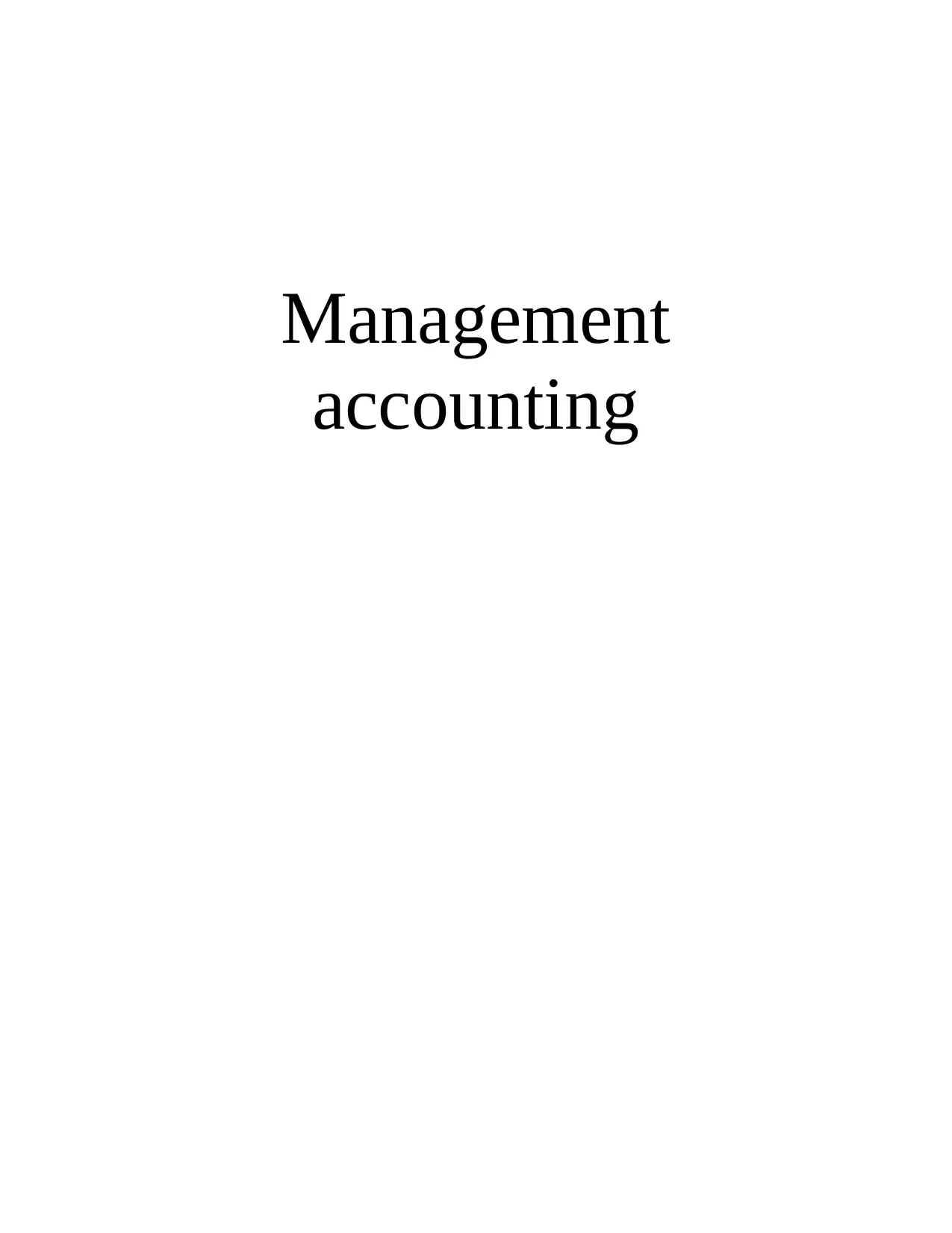
Management
accounting
accounting
Paraphrase This Document
Need a fresh take? Get an instant paraphrase of this document with our AI Paraphraser
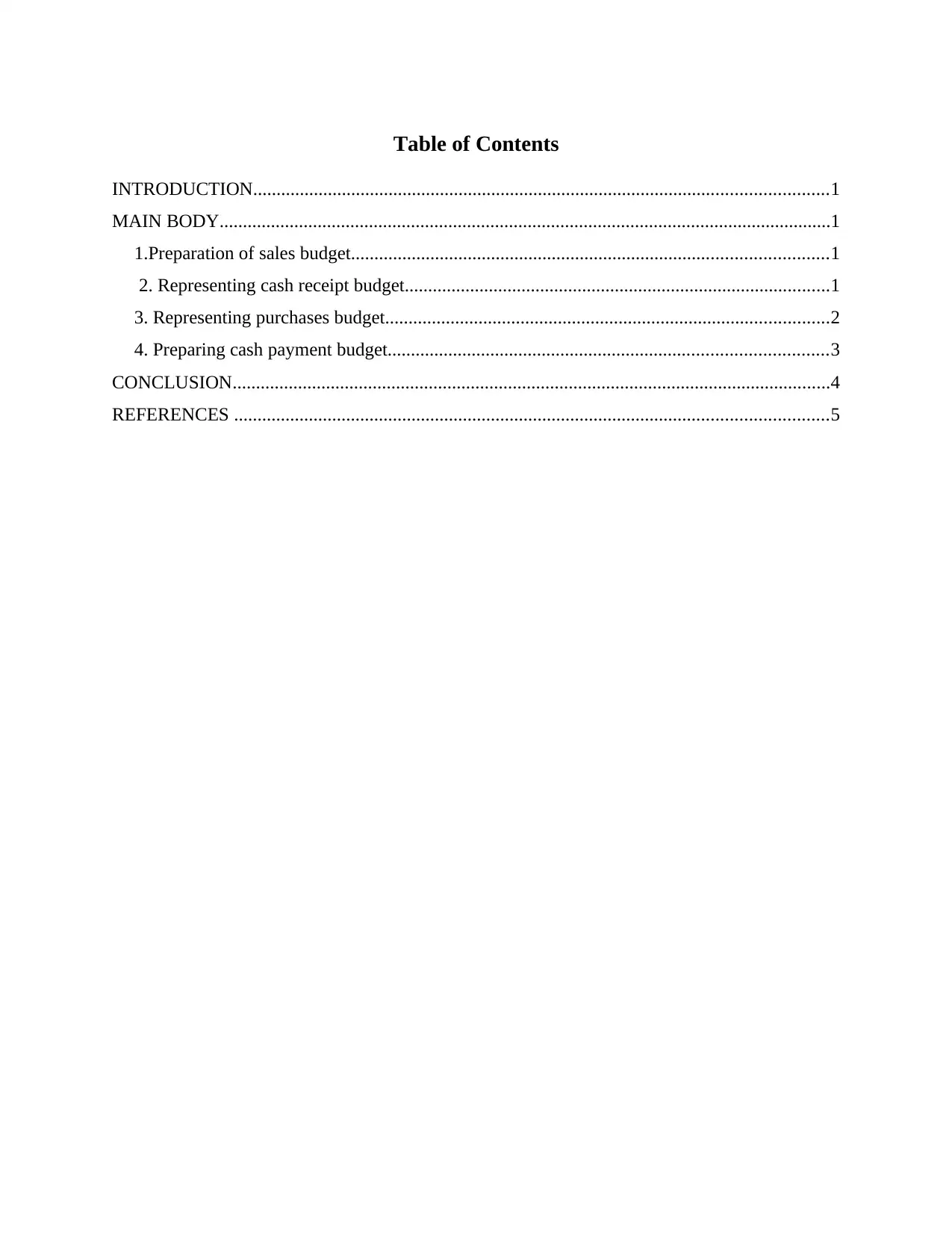
Table of Contents
INTRODUCTION...........................................................................................................................1
MAIN BODY...................................................................................................................................1
1.Preparation of sales budget......................................................................................................1
2. Representing cash receipt budget...........................................................................................1
3. Representing purchases budget...............................................................................................2
4. Preparing cash payment budget..............................................................................................3
CONCLUSION................................................................................................................................4
REFERENCES ...............................................................................................................................5
INTRODUCTION...........................................................................................................................1
MAIN BODY...................................................................................................................................1
1.Preparation of sales budget......................................................................................................1
2. Representing cash receipt budget...........................................................................................1
3. Representing purchases budget...............................................................................................2
4. Preparing cash payment budget..............................................................................................3
CONCLUSION................................................................................................................................4
REFERENCES ...............................................................................................................................5
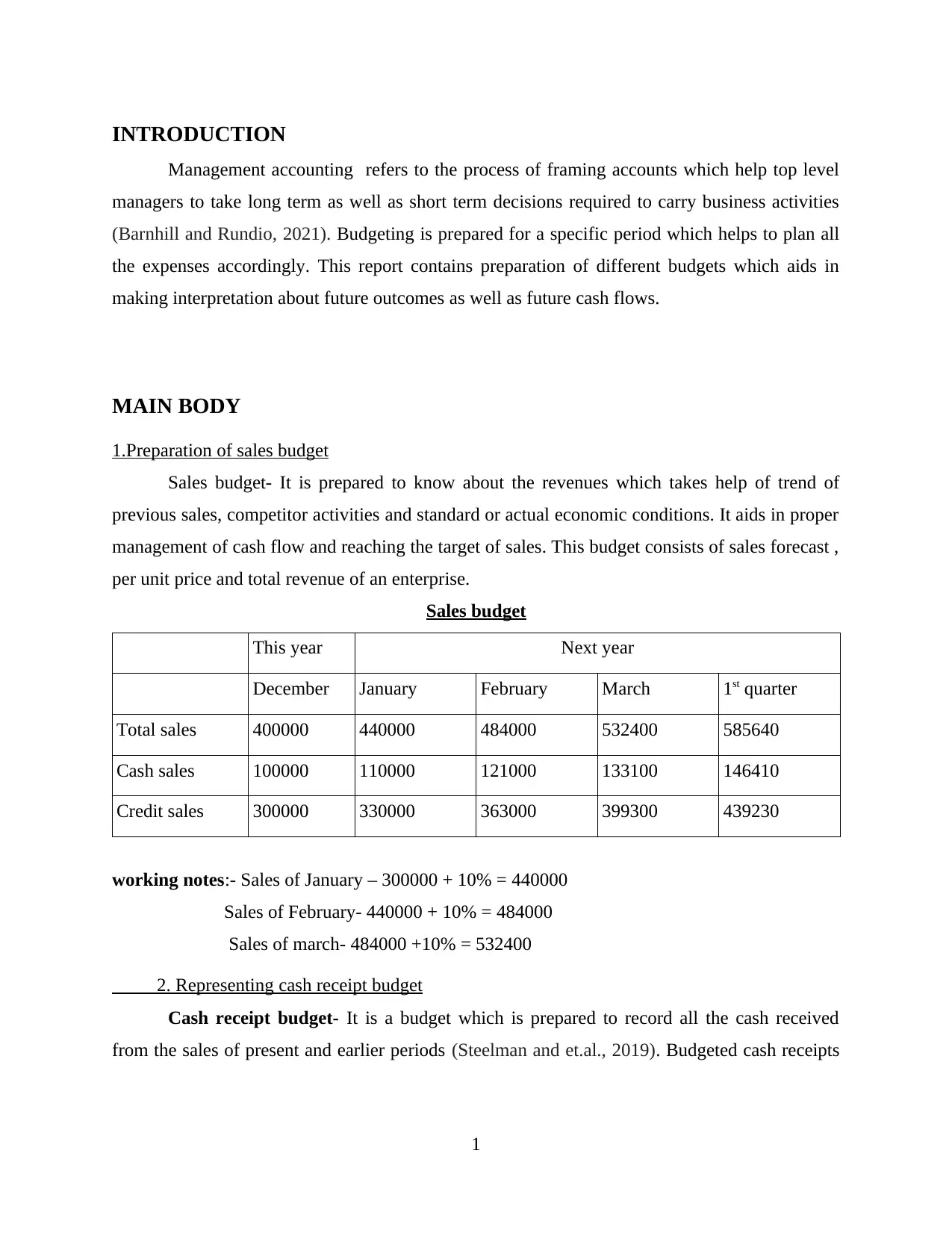
INTRODUCTION
Management accounting refers to the process of framing accounts which help top level
managers to take long term as well as short term decisions required to carry business activities
(Barnhill and Rundio, 2021). Budgeting is prepared for a specific period which helps to plan all
the expenses accordingly. This report contains preparation of different budgets which aids in
making interpretation about future outcomes as well as future cash flows.
MAIN BODY
1.Preparation of sales budget
Sales budget- It is prepared to know about the revenues which takes help of trend of
previous sales, competitor activities and standard or actual economic conditions. It aids in proper
management of cash flow and reaching the target of sales. This budget consists of sales forecast ,
per unit price and total revenue of an enterprise.
Sales budget
This year Next year
December January February March 1st quarter
Total sales 400000 440000 484000 532400 585640
Cash sales 100000 110000 121000 133100 146410
Credit sales 300000 330000 363000 399300 439230
working notes:- Sales of January – 300000 + 10% = 440000
Sales of February- 440000 + 10% = 484000
Sales of march- 484000 +10% = 532400
2. Representing cash receipt budget
Cash receipt budget- It is a budget which is prepared to record all the cash received
from the sales of present and earlier periods (Steelman and et.al., 2019). Budgeted cash receipts
1
Management accounting refers to the process of framing accounts which help top level
managers to take long term as well as short term decisions required to carry business activities
(Barnhill and Rundio, 2021). Budgeting is prepared for a specific period which helps to plan all
the expenses accordingly. This report contains preparation of different budgets which aids in
making interpretation about future outcomes as well as future cash flows.
MAIN BODY
1.Preparation of sales budget
Sales budget- It is prepared to know about the revenues which takes help of trend of
previous sales, competitor activities and standard or actual economic conditions. It aids in proper
management of cash flow and reaching the target of sales. This budget consists of sales forecast ,
per unit price and total revenue of an enterprise.
Sales budget
This year Next year
December January February March 1st quarter
Total sales 400000 440000 484000 532400 585640
Cash sales 100000 110000 121000 133100 146410
Credit sales 300000 330000 363000 399300 439230
working notes:- Sales of January – 300000 + 10% = 440000
Sales of February- 440000 + 10% = 484000
Sales of march- 484000 +10% = 532400
2. Representing cash receipt budget
Cash receipt budget- It is a budget which is prepared to record all the cash received
from the sales of present and earlier periods (Steelman and et.al., 2019). Budgeted cash receipts
1
⊘ This is a preview!⊘
Do you want full access?
Subscribe today to unlock all pages.

Trusted by 1+ million students worldwide
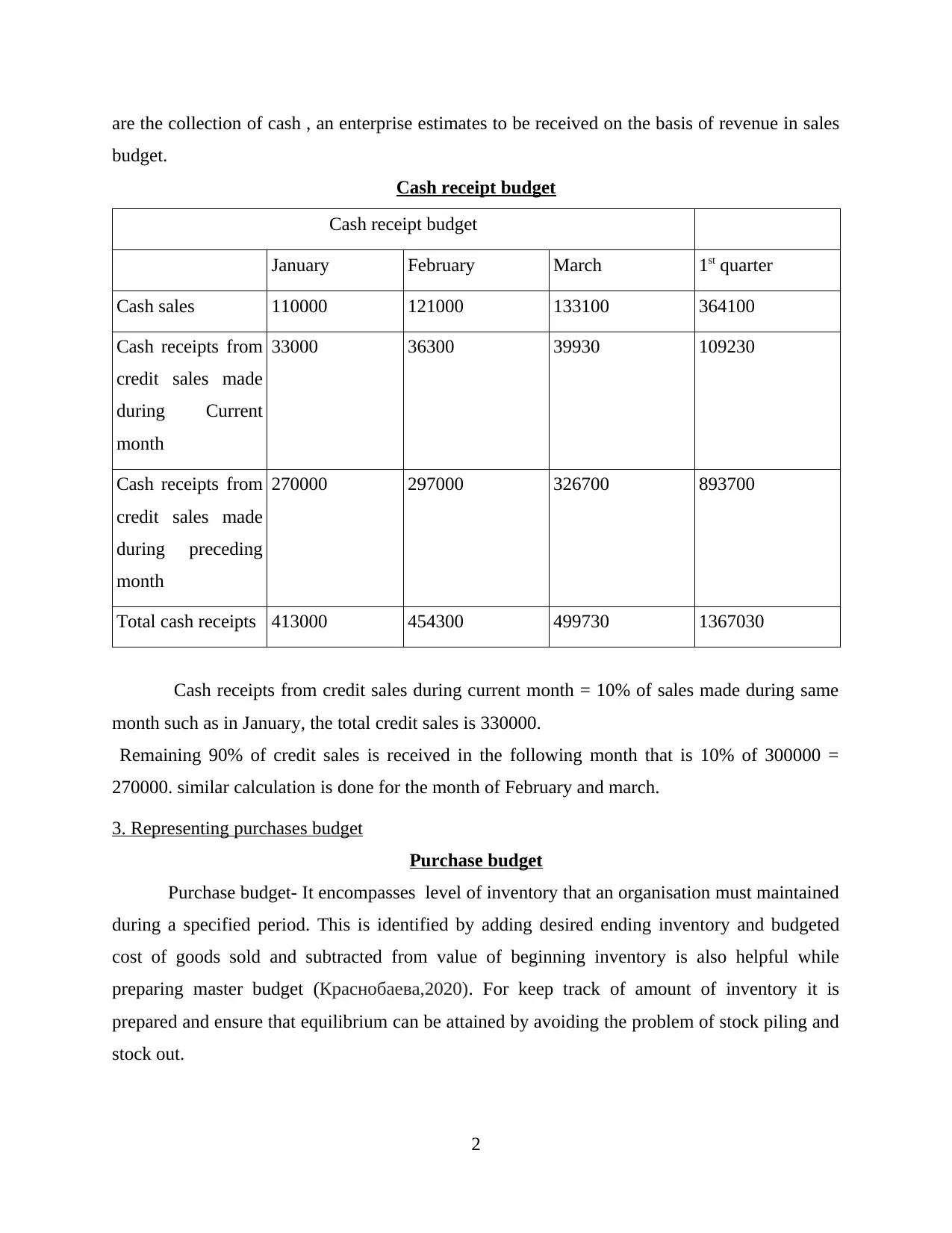
are the collection of cash , an enterprise estimates to be received on the basis of revenue in sales
budget.
Cash receipt budget
Cash receipt budget
January February March 1st quarter
Cash sales 110000 121000 133100 364100
Cash receipts from
credit sales made
during Current
month
33000 36300 39930 109230
Cash receipts from
credit sales made
during preceding
month
270000 297000 326700 893700
Total cash receipts 413000 454300 499730 1367030
Cash receipts from credit sales during current month = 10% of sales made during same
month such as in January, the total credit sales is 330000.
Remaining 90% of credit sales is received in the following month that is 10% of 300000 =
270000. similar calculation is done for the month of February and march.
3. Representing purchases budget
Purchase budget
Purchase budget- It encompasses level of inventory that an organisation must maintained
during a specified period. This is identified by adding desired ending inventory and budgeted
cost of goods sold and subtracted from value of beginning inventory is also helpful while
preparing master budget (Краснобаева,2020). For keep track of amount of inventory it is
prepared and ensure that equilibrium can be attained by avoiding the problem of stock piling and
stock out.
2
budget.
Cash receipt budget
Cash receipt budget
January February March 1st quarter
Cash sales 110000 121000 133100 364100
Cash receipts from
credit sales made
during Current
month
33000 36300 39930 109230
Cash receipts from
credit sales made
during preceding
month
270000 297000 326700 893700
Total cash receipts 413000 454300 499730 1367030
Cash receipts from credit sales during current month = 10% of sales made during same
month such as in January, the total credit sales is 330000.
Remaining 90% of credit sales is received in the following month that is 10% of 300000 =
270000. similar calculation is done for the month of February and march.
3. Representing purchases budget
Purchase budget
Purchase budget- It encompasses level of inventory that an organisation must maintained
during a specified period. This is identified by adding desired ending inventory and budgeted
cost of goods sold and subtracted from value of beginning inventory is also helpful while
preparing master budget (Краснобаева,2020). For keep track of amount of inventory it is
prepared and ensure that equilibrium can be attained by avoiding the problem of stock piling and
stock out.
2
Paraphrase This Document
Need a fresh take? Get an instant paraphrase of this document with our AI Paraphraser
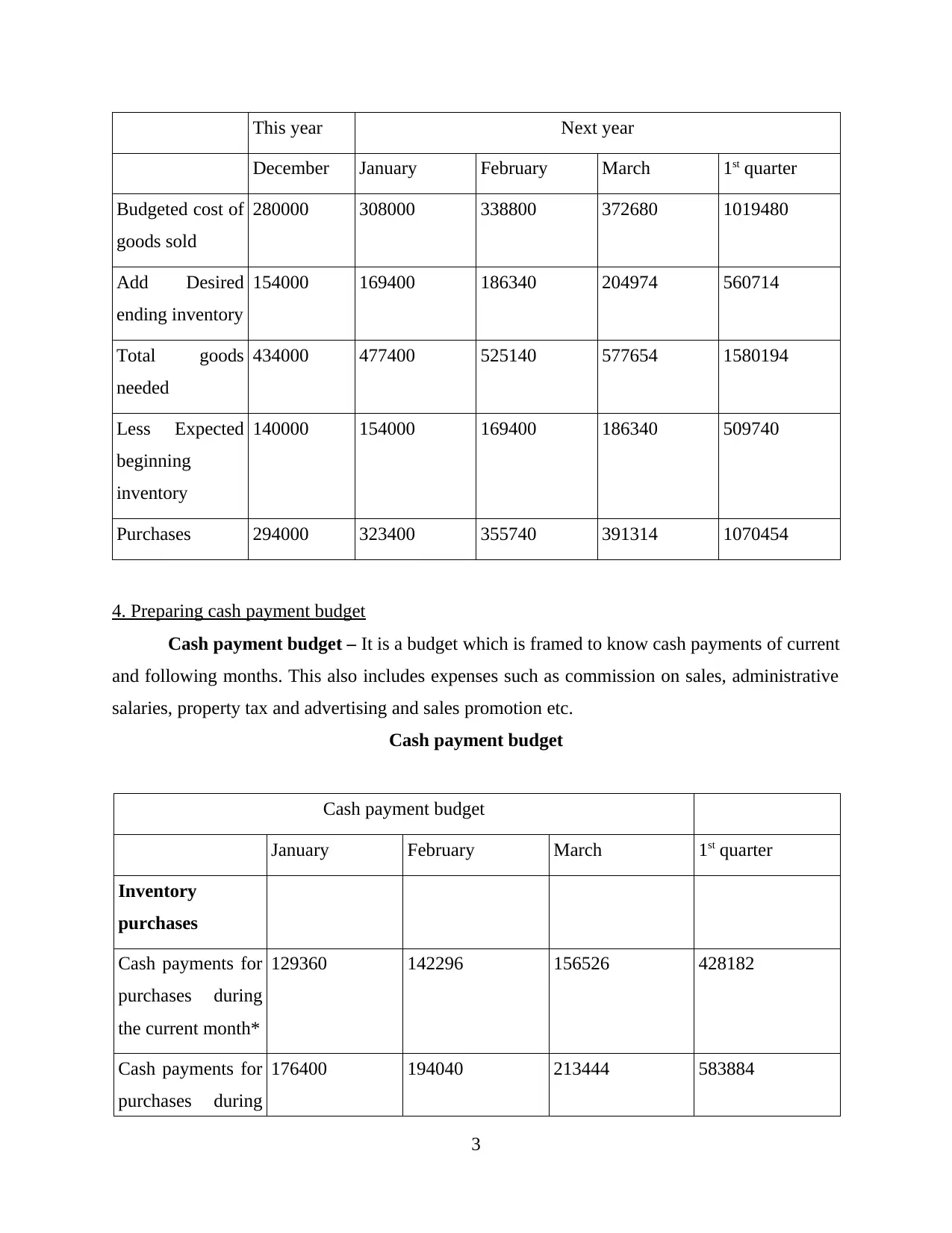
This year Next year
December January February March 1st quarter
Budgeted cost of
goods sold
280000 308000 338800 372680 1019480
Add Desired
ending inventory
154000 169400 186340 204974 560714
Total goods
needed
434000 477400 525140 577654 1580194
Less Expected
beginning
inventory
140000 154000 169400 186340 509740
Purchases 294000 323400 355740 391314 1070454
4. Preparing cash payment budget
Cash payment budget – It is a budget which is framed to know cash payments of current
and following months. This also includes expenses such as commission on sales, administrative
salaries, property tax and advertising and sales promotion etc.
Cash payment budget
Cash payment budget
January February March 1st quarter
Inventory
purchases
Cash payments for
purchases during
the current month*
129360 142296 156526 428182
Cash payments for
purchases during
176400 194040 213444 583884
3
December January February March 1st quarter
Budgeted cost of
goods sold
280000 308000 338800 372680 1019480
Add Desired
ending inventory
154000 169400 186340 204974 560714
Total goods
needed
434000 477400 525140 577654 1580194
Less Expected
beginning
inventory
140000 154000 169400 186340 509740
Purchases 294000 323400 355740 391314 1070454
4. Preparing cash payment budget
Cash payment budget – It is a budget which is framed to know cash payments of current
and following months. This also includes expenses such as commission on sales, administrative
salaries, property tax and advertising and sales promotion etc.
Cash payment budget
Cash payment budget
January February March 1st quarter
Inventory
purchases
Cash payments for
purchases during
the current month*
129360 142296 156526 428182
Cash payments for
purchases during
176400 194040 213444 583884
3
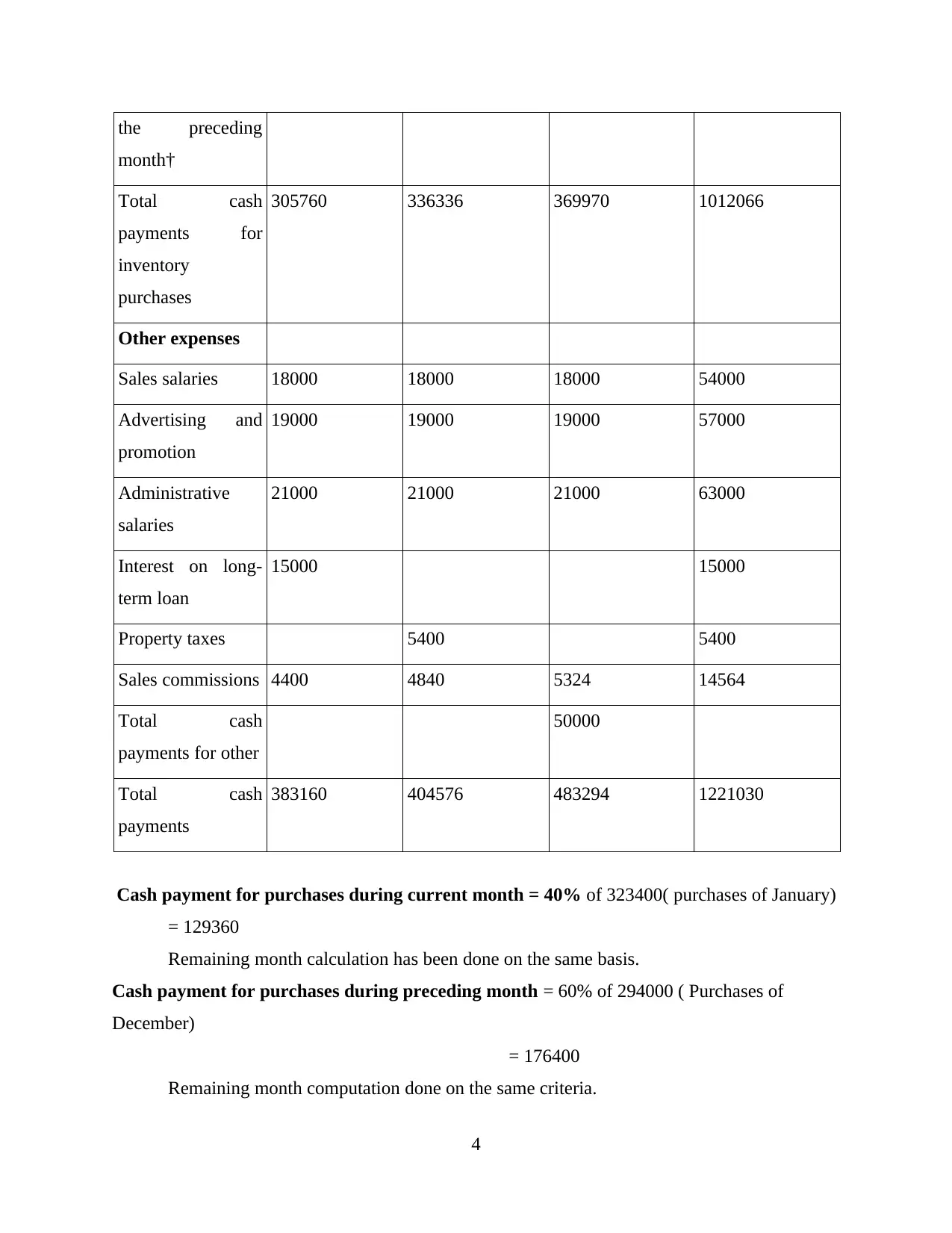
the preceding
month†
Total cash
payments for
inventory
purchases
305760 336336 369970 1012066
Other expenses
Sales salaries 18000 18000 18000 54000
Advertising and
promotion
19000 19000 19000 57000
Administrative
salaries
21000 21000 21000 63000
Interest on long-
term loan
15000 15000
Property taxes 5400 5400
Sales commissions 4400 4840 5324 14564
Total cash
payments for other
50000
Total cash
payments
383160 404576 483294 1221030
Cash payment for purchases during current month = 40% of 323400( purchases of January)
= 129360
Remaining month calculation has been done on the same basis.
Cash payment for purchases during preceding month = 60% of 294000 ( Purchases of
December)
= 176400
Remaining month computation done on the same criteria.
4
month†
Total cash
payments for
inventory
purchases
305760 336336 369970 1012066
Other expenses
Sales salaries 18000 18000 18000 54000
Advertising and
promotion
19000 19000 19000 57000
Administrative
salaries
21000 21000 21000 63000
Interest on long-
term loan
15000 15000
Property taxes 5400 5400
Sales commissions 4400 4840 5324 14564
Total cash
payments for other
50000
Total cash
payments
383160 404576 483294 1221030
Cash payment for purchases during current month = 40% of 323400( purchases of January)
= 129360
Remaining month calculation has been done on the same basis.
Cash payment for purchases during preceding month = 60% of 294000 ( Purchases of
December)
= 176400
Remaining month computation done on the same criteria.
4
⊘ This is a preview!⊘
Do you want full access?
Subscribe today to unlock all pages.

Trusted by 1+ million students worldwide

CONCLUSION
5
5
Paraphrase This Document
Need a fresh take? Get an instant paraphrase of this document with our AI Paraphraser
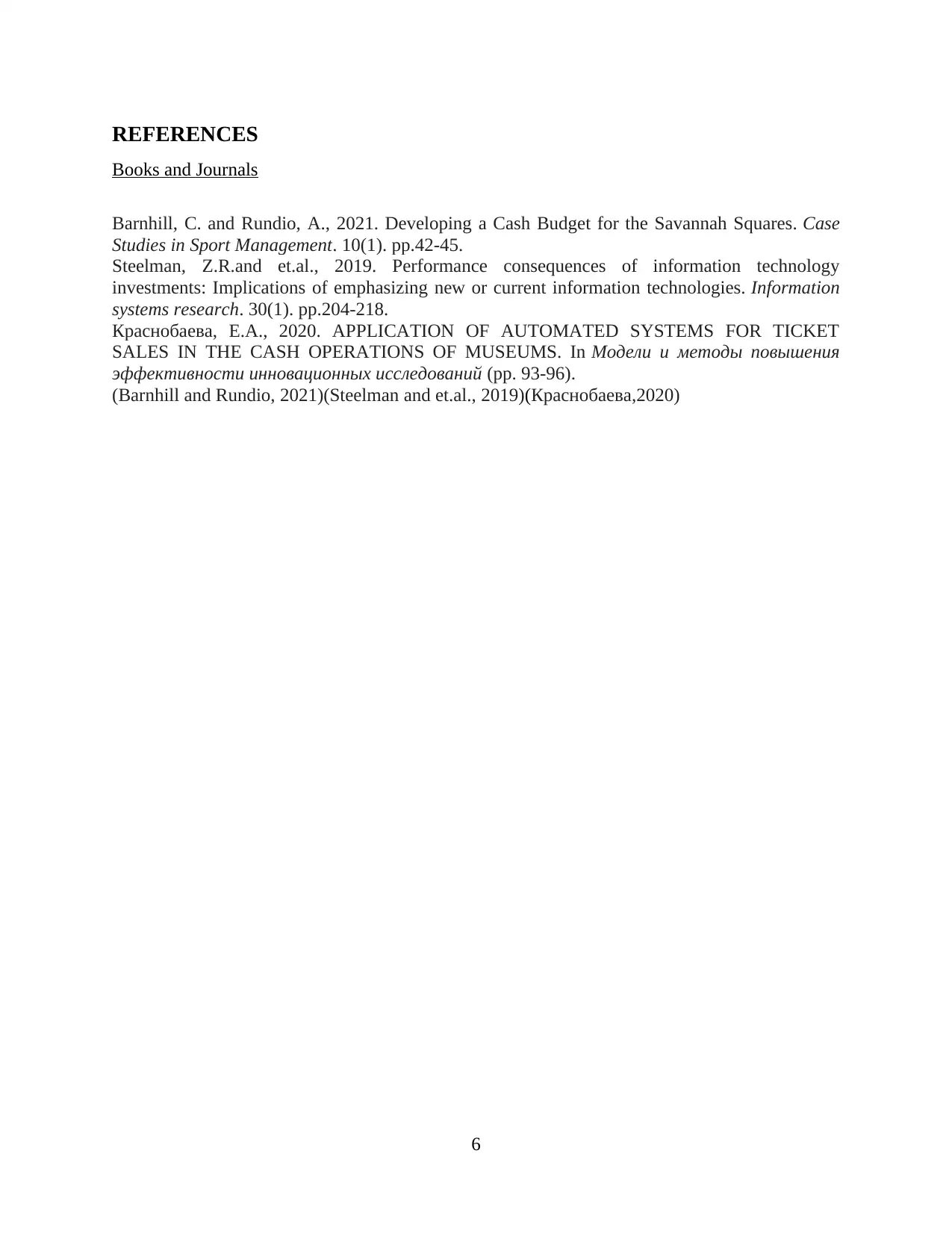
REFERENCES
Books and Journals
Barnhill, C. and Rundio, A., 2021. Developing a Cash Budget for the Savannah Squares. Case
Studies in Sport Management. 10(1). pp.42-45.
Steelman, Z.R.and et.al., 2019. Performance consequences of information technology
investments: Implications of emphasizing new or current information technologies. Information
systems research. 30(1). pp.204-218.
Краснобаева, Е.А., 2020. APPLICATION OF AUTOMATED SYSTEMS FOR TICKET
SALES IN THE CASH OPERATIONS OF MUSEUMS. In Модели и методы повышения
эффективности инновационных исследований (pp. 93-96).
(Barnhill and Rundio, 2021)(Steelman and et.al., 2019)(Краснобаева,2020)
6
Books and Journals
Barnhill, C. and Rundio, A., 2021. Developing a Cash Budget for the Savannah Squares. Case
Studies in Sport Management. 10(1). pp.42-45.
Steelman, Z.R.and et.al., 2019. Performance consequences of information technology
investments: Implications of emphasizing new or current information technologies. Information
systems research. 30(1). pp.204-218.
Краснобаева, Е.А., 2020. APPLICATION OF AUTOMATED SYSTEMS FOR TICKET
SALES IN THE CASH OPERATIONS OF MUSEUMS. In Модели и методы повышения
эффективности инновационных исследований (pp. 93-96).
(Barnhill and Rundio, 2021)(Steelman and et.al., 2019)(Краснобаева,2020)
6
1 out of 8
Related Documents
Your All-in-One AI-Powered Toolkit for Academic Success.
+13062052269
info@desklib.com
Available 24*7 on WhatsApp / Email
![[object Object]](/_next/static/media/star-bottom.7253800d.svg)
Unlock your academic potential
Copyright © 2020–2025 A2Z Services. All Rights Reserved. Developed and managed by ZUCOL.




